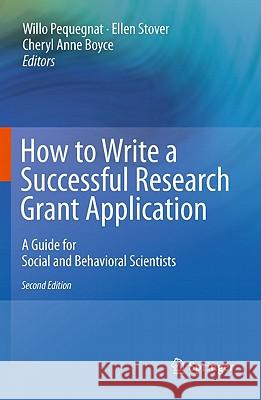How to Write a Successful Research Grant Application: A Guide for Social and Behavioral Scientists » książka
How to Write a Successful Research Grant Application: A Guide for Social and Behavioral Scientists
ISBN-13: 9781441914538 / Angielski / Miękka / 2010 / 300 str.
How to Write a Successful Research Grant Application: A Guide for Social and Behavioral Scientists
ISBN-13: 9781441914538 / Angielski / Miękka / 2010 / 300 str.
(netto: 421,70 VAT: 5%)
Najniższa cena z 30 dni: 424,07
ok. 22 dni roboczych
Dostawa w 2026 r.
Darmowa dostawa!
Over the last fifty years behavioral and medical research has been generously supported by the federal government, private foundations, and other philanthropic organizations contributing to the development of a vibrant public health system both in the United States and worldwide. However, these funds are dwindling and to stay competitive, investigators must understand the funding environment and know how to translate their hypotheses into research grant applications that reviewers evaluate as having scientific merit. The Second Edition of 'How to Write a Successful Research Grant Application' is the only book of its kind written by federal research investigators which provides technical assistance for researchers applying for biobehavioral and psychosocial research funding and can give them an edge in this competitive environment. The book provides invaluable tips on all aspects of the art of grantsmanship, including: how to determine research opportunities and priorities, how to develop the different elements of an application, how to negotiate the electronic submission and review processes, and how to disseminate the findings. Charts, visual aids, Web links, an extensive real-world example of a research proposal with budget, and a "So You Were Awarded Your Grant--Now What?" chapter show prospective applicants how to: - Formulate a testworthy--and interesting--hypothesis. - Select the appropriate research mechanism. - Avoid common pitfalls in proposal writing. - Develop an adequate control group. - Conduct a rigorous qualitative inquiry. - Develop a budget justification of costs. - Develop a human subjects of animal welfare plan. - Write a data analytic plan. - Design a quality control/assurance program. - Read between the lines of a summary of the review of your application. Although its focus is on Public Health Service funding, 'How to Write a Successful Research Grant' is equally useful for all research proposals, including graduate students preparing a thesis or dissertation proposal. Service providers in community-based organizations and public health agencies will also find this a useful resource in preparing a proposal to compete for grant funds from state and community resources, non-government organizations, and foundations.











